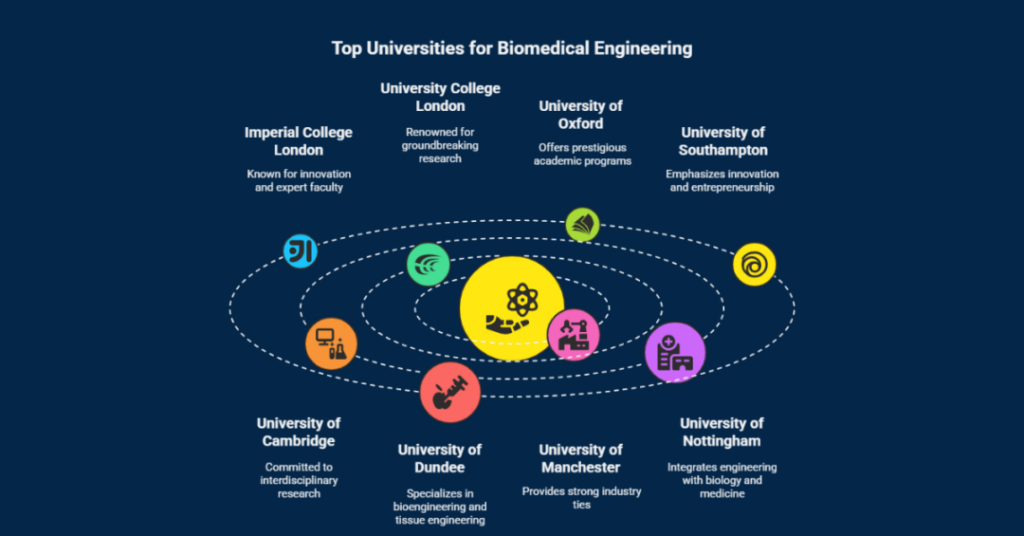18 July 2025
8 minutes read
8 Biomedical Engineering Universities In UK: Average Fees And Ranking For Indian Students

Key Takeaways
- Biomedical engineering universities UK ranking is only part of the story—focus also on research quality, industry links, and course fit.
- Top choices like Imperial, Oxford, and UCL offer cutting-edge labs, expert faculty, and global career exposure.
- Average tuition fees for Indian students range from £10,000 to £35,000, with scholarships and part-time work options available.
Over 3,000 Indian students applied to biomedical engineering courses in the UK last year alone — and most of them had no clue how to pick the right university. Because guess what? Ranking isn’t everything, and neither is the tuition fee. If you’re only chasing the University of Surrey because it sounds prestigious or ignoring Swansea just because it’s underrated, you might be setting yourself up for disappointment.
But most students are blindsided by big names and smooth-talking counsellors. They rarely tell you about the actual industry exposure, the real ROI, or whether the program actually prepares you for jobs in healthcare tech. So, if you’re serious about biomedical engineering, you need to go beyond just “university rankings” and understand which UK universities offer the right mix of academics, research, and affordability — especially for Indian students.
8 Top Universities for Biomedical Engineering Degree
1. Imperial College London
Imperial College London stands out as a consistent global leader in biomedical engineering education and research. Its strong emphasis on innovation, coupled with a faculty comprising experts in various fields, makes it an excellent choice for aspiring engineers.

Students at Imperial can explore a wide range of topics, including medical devices, tissue engineering, and bioinformatics. The university’s collaborative atmosphere and access to cutting-edge facilities ensure graduates are well-prepared to contribute to the healthcare sector.
2. University College London (UCL)
University College London, commonly referred to as UCL, is renowned for its groundbreaking research in the field of biomedical engineering. With access to state-of-the-art laboratories and close collaborations with healthcare institutions, UCL offers a vibrant environment for students eager to make strides in this dynamic field.
Its program encompasses diverse areas, from medical imaging to biomaterials, allowing students to tailor their education to their specific interests.
3. University of Oxford
The University of Oxford, known worldwide for its academic excellence, offers a prestigious biomedical engineering program. Students at Oxford benefit from a world-class faculty and state-of-the-art research facilities.
The program provides a solid foundation in both engineering principles and medical technology, making it a top choice for those seeking a comprehensive education in this field.
4. University of Southampton
The University of Southampton is renowned for its emphasis on innovation and entrepreneurship in biomedical engineering. The program combines rigorous academic coursework with hands-on projects, allowing students to gain practical experience. Southampton’s strong industry connections and research initiatives ensure graduates are well-prepared for a variety of careers in the biomedical field.
5. University of Cambridge
Cambridge University’s strong commitment to interdisciplinary research makes it an excellent choice for aspiring biomedical engineers. Students benefit from a rigorous curriculum and have the opportunity to work on cutting-edge projects.
The institution’s collaborative atmosphere fosters creativity and innovation, making it an ideal environment for those looking to excel in this dynamic field.
6. University of Dundee
The University of Dundee is known for its expertise in bioengineering and tissue engineering. Its specialized programs prepare students for careers in these emerging fields.
Dundee’s commitment to hands-on learning and cutting-edge research ensures that graduates are well-equipped to contribute to advancements in healthcare technology.
7. University of Manchester
The University of Manchester offers a wide range of biomedical engineering courses, covering topics such as artificial organs and medical imaging. The institution’s strong industry ties provide students with valuable networking opportunities. Graduates of Manchester’s program are well-positioned to excel in various areas of the healthcare technology sector.
8. University of Nottingham
The University of Nottingham‘s biomedical engineering program integrates engineering principles with biology and medicine. The university’s strong focus on research ensures that students remain at the forefront of the field. Nottingham’s commitment to innovation and collaboration ensures graduates are well-prepared to tackle complex challenges in healthcare technology.
Biomedical Engineering in the United Kingdom
The Rising Demand for Biomedical Engineers
The demand for biomedical engineers is on the rise, driven by advancements in healthcare technology and an aging population. Biomedical engineers play a crucial role in developing medical devices, diagnostic tools, prosthetics, and treatment methods that improve patient care and healthcare outcomes. The strong foundation provided by UK universities prepares graduates to meet these growing demands.
Specializations Within Biomedical Engineering
Within the broad field of biomedical engineering, students often have the opportunity to specialize in areas such as biomaterials, medical imaging, biomechanics, and more. These specializations allow students to align their education and career goals with their specific interests within the field.
Admission and Education
Entry Requirements
While entry requirements may vary by university, they generally include academic qualifications (such as A-levels or equivalent), English language proficiency (e.g., IELTS or TOEFL scores), and sometimes an admissions interview. Prospective students should carefully review the specific entry requirements of the universities they are interested in.
Undergraduate and Postgraduate Programs
UK universities offer both undergraduate and postgraduate programs in biomedical engineering. Undergraduate degrees typically provide a comprehensive introduction to the field, while postgraduate programs, including master’s and Ph.D. options, offer advanced knowledge and research opportunities.
Scholarships for International Students
Many UK universities offer scholarships and financial aid to international students. These scholarships can significantly alleviate the financial burden of pursuing a degree abroad. Prospective students are encouraged to explore scholarship opportunities through university websites and scholarship databases.
Career Opportunities
Diverse Career Paths
Biomedical engineering graduates can pursue diverse career paths. Some may choose to work in hospitals, using their skills to maintain and operate medical equipment.
Others may join research institutions to innovate and develop new technologies. Additionally, opportunities exist in medical device companies, where engineers design and improve healthcare technologies.
Research and Development
The field of biomedical engineering offers substantial opportunities for research and development. Graduates can contribute to advancements in healthcare through the creation of innovative medical devices, diagnostic tools, and treatment methods.
Tuition Fees and Financial Considerations
When considering pursuing a degree in biomedical engineering in the United Kingdom, it’s crucial to factor in tuition fees and various financial considerations.
The cost of education is a significant aspect of your decision-making process, and understanding the financial landscape can help you plan effectively for your academic journey.
Tuition Fees
Tuition fees for biomedical engineering programs in the UK can vary widely depending on the university, the level of the program (undergraduate or postgraduate), and whether you are an international or domestic student. Here’s an overview of what to expect:
Undergraduate Programs
For undergraduate programs, tuition fees for international students typically range from £10,000 to £30,000 per year. However, prestigious institutions may have higher fees.
It’s essential to research specific universities and programs to get an accurate picture of their tuition costs. Additionally, for UK and EU students, tuition fees may differ due to government regulations and funding options.
Postgraduate Programs
Postgraduate programs, such as master’s and Ph.D. degrees, can have varying tuition fees. On average, international students can expect to pay between £10,000 and £35,000 per year for postgraduate biomedical engineering programs. Prestigious universities or specialized programs may have higher fees.
Scholarships and Financial Aid
While tuition fees can be a significant financial burden, there are numerous scholarship and financial aid opportunities available to help mitigate these costs:
University Scholarships
Many UK universities offer scholarships specifically for international students. These scholarships can range from partial tuition waivers to full scholarships that cover tuition and living expenses. Each university may have its own scholarship programs, so it’s essential to explore their websites and check for eligibility criteria and application deadlines.
Government Scholarships
Some countries offer scholarships to their citizens to study abroad. Check with your home country’s government or relevant institutions for information on scholarships and financial support for studying in the UK.
External Scholarships
Various organizations, both in the UK and globally, provide scholarships for international students pursuing higher education. These organizations may focus on specific fields of study, academic excellence, or financial need. Research and apply for these scholarships well in advance of your intended start date.
Research Assistantships and Teaching Assistantships
For postgraduate students, opportunities for research assistantships (RA) or teaching assistantships (TA) may be available. These positions can provide a stipend and cover tuition fees in exchange for research or teaching duties. Inquire with your department or program about RA and TA positions.
Part-Time Work
International students in the UK are typically allowed to work part-time during their studies. The number of hours you can work may be subject to immigration regulations. Part-time work can help offset living expenses while studying.
Living Expenses
In addition to tuition fees, you should consider the cost of living in the UK. Expenses such as accommodation, food, transportation, and healthcare can add to the overall cost of your education. It’s advisable to create a realistic budget that includes these expenses and allows for a comfortable student life.
Financial Planning
Planning for your financial journey as a student in the UK is essential. Here are some tips to help you manage your finances effectively:
1. Create a Budget
Develop a comprehensive budget that outlines your expected income (scholarships, part-time work) and expenses (tuition fees, accommodation, food, transportation). Stick to your budget to ensure financial stability.
2. Explore Banking Options
Open a bank account in the UK to manage your finances efficiently. Research different banks and their offerings to find the one that best suits your needs.
3. Seek Financial Advice
Universities often have financial advisors or support services for international students. Don’t hesitate to reach out for guidance on managing your finances and understanding UK banking systems.
4. Save and Plan Ahead
Start saving for your education well in advance. Consider setting up a savings account specifically for your tuition and living expenses.
5. Consider Part-Time Work
While studying, you can work part-time to cover living expenses and gain work experience. Ensure you are aware of any visa restrictions regarding employment.
Conclusion
The field of biomedical engineering holds immense promise for those passionate about improving human health and healthcare. Choosing one of the top universities in the UK for biomedical engineering can provide a strong foundation for a successful career in this dynamic and vital field.
Remember that the right university is not just about its ranking but also its alignment with your personal interests and career aspirations. Visit campuses, speak with current students, and review program curricula to make a well-informed decision. Your journey toward a fulfilling career in biomedical engineering begins with the right educational institution.
To get into a top UK university isn’t just about grades—it’s about strategy. Ambitio’s AI-powered platform and expert consultants help you tackle applications, study gaps, and visa approvals with confidence. No confusion, no wasted time—just a clear path to your dream school. So if you want to study in UK, Ambitio is the answer.
FAQs
What is Biomedical Engineering?
Biomedical engineering is a multidisciplinary field that combines principles of engineering, biology, and medicine to develop technologies and solutions for improving human health and healthcare.
Why is the Ranking of Biomedical Engineering Universities Important?
University rankings provide valuable insights into the quality of education, research opportunities, and career prospects offered by institutions. They can help you make an informed decision about where to pursue your biomedical engineering degree.
What Are Some Top Universities for Biomedical Engineering in the UK?
Some top-ranked universities for biomedical engineering in the UK include Imperial College London, University College London (UCL), and the University of Oxford, among others.
What Career Opportunities Does Biomedical Engineering Offer?
Biomedical engineering graduates can pursue careers in various fields, such as medical device design, tissue engineering, healthcare technology management, and research and development in healthcare industries.
Are There Scholarships Available for International Students in UK Biomedical Engineering Programs?
Yes, many UK universities offer scholarships and financial aid to international students. You can explore university websites and scholarship databases for specific opportunities.
What Are the Entry Requirements for Biomedical Engineering Programs in the UK?
Entry requirements may vary by university, but generally include academic qualifications (such as A-levels or equivalent), English language proficiency (e.g., IELTS or TOEFL scores), and sometimes an admissions interview.
Can I Pursue Postgraduate Studies in Biomedical Engineering in the UK?
Yes, many UK universities offer postgraduate programs in biomedical engineering, including master’s and Ph.D. programs. These can provide advanced knowledge and research opportunities in the field.
How Does Biomedical Engineering Contribute to Healthcare Advancements?
Biomedical engineering plays a crucial role in developing medical devices, diagnostic tools, prosthetics, and treatment methods, contributing to improved patient care and healthcare outcomes.
Are There Opportunities for Specialization within Biomedical Engineering Programs?
Yes, students can often choose specialized tracks within biomedical engineering programs, such as biomaterials, medical imaging, or biomechanics, based on their interests and career goals.
What is the Outlook for Biomedical Engineers in the UK Job Market?
The demand for biomedical engineers is expected to grow as healthcare technology advances. Graduates in this field can find opportunities in hospitals, research institutions, medical device companies, and more.

You can study at top universities worldwide!
Get expert tips and tricks to get into top universities with a free expert session.
Book Your Free 30-Minute Session Now! Book a call now




























